Business Ethics: Evaluating Mr. Ali's Actions Using Ethical Frameworks
VerifiedAdded on 2020/03/16
|20
|5702
|36
Essay
AI Summary
This assignment delves into the realm of business ethics, focusing on Mr. Ali's actions and their moral implications. It meticulously examines the ethical dimensions of bribery through the lenses of consequential and non-consequential theories, as well as virtue ethics. The analysis considers the case study of Enron, exploring how the company's rise and fall can be related to ethical failures. The assignment dissects egoism and utilitarianism, key components of consequential theory, and contrasts them with Kant's deontological ethics, a non-consequential approach. By applying these frameworks, the assignment evaluates the ethical correctness of Mr. Ali's decision to engage in bribery, considering both the potential outcomes and the inherent moral principles involved. It also explores the concepts of personal versus impersonal egoism and the utilitarian emphasis on maximizing overall happiness. The assignment provides a comprehensive exploration of ethical decision-making in a business context.
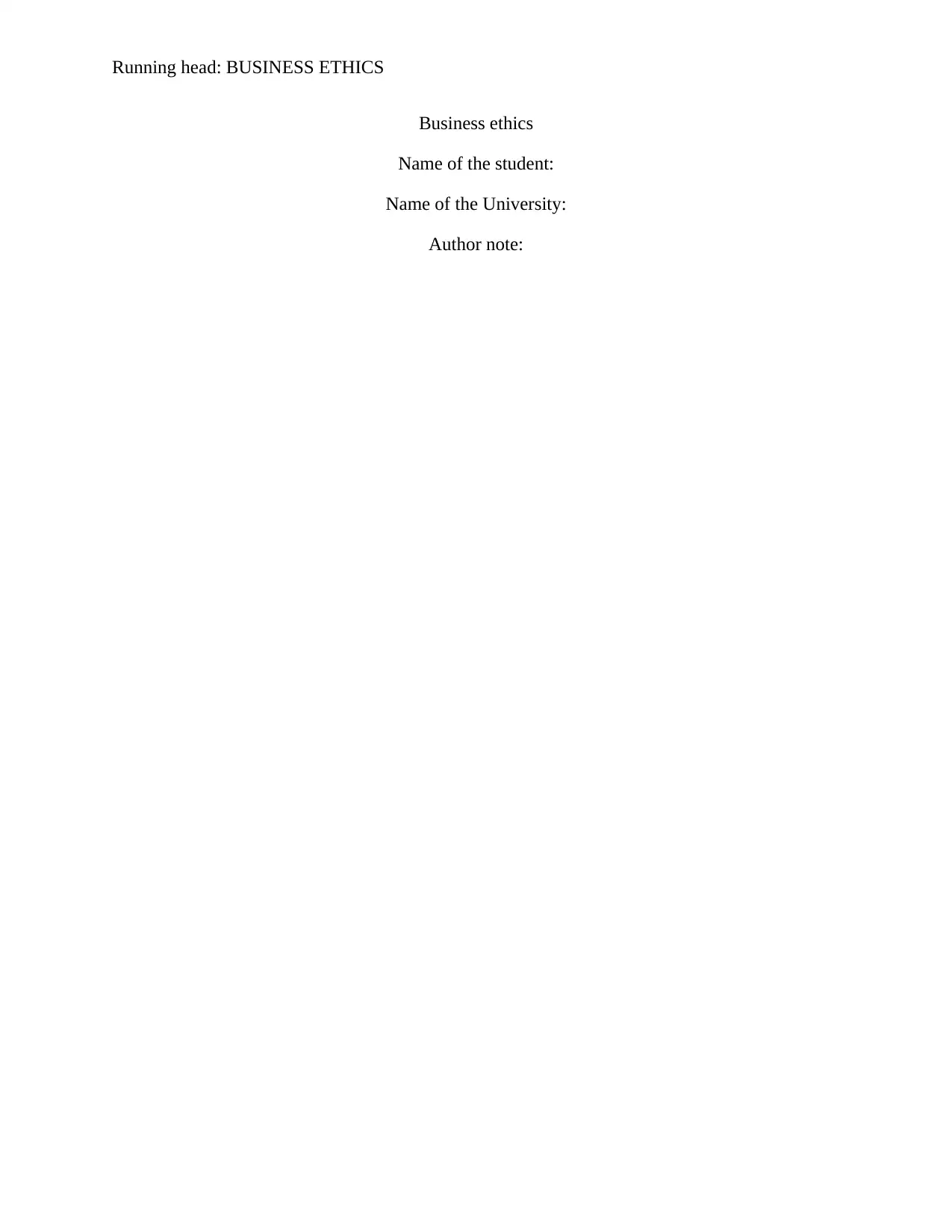
Running head: BUSINESS ETHICS
Business ethics
Name of the student:
Name of the University:
Author note:
Business ethics
Name of the student:
Name of the University:
Author note:
Paraphrase This Document
Need a fresh take? Get an instant paraphrase of this document with our AI Paraphraser
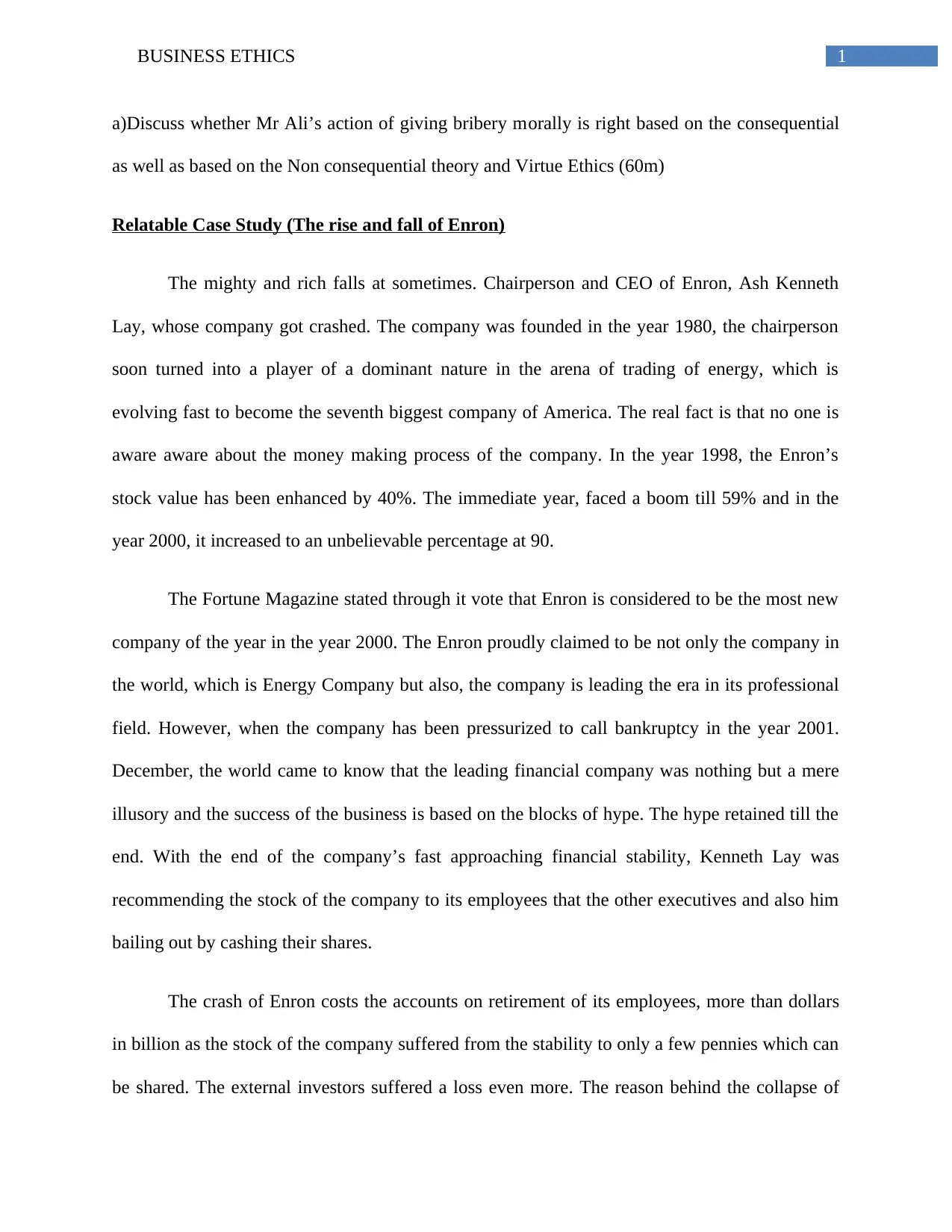
1BUSINESS ETHICS
a)Discuss whether Mr Ali’s action of giving bribery morally is right based on the consequential
as well as based on the Non consequential theory and Virtue Ethics (60m)
Relatable Case Study (The rise and fall of Enron)
The mighty and rich falls at sometimes. Chairperson and CEO of Enron, Ash Kenneth
Lay, whose company got crashed. The company was founded in the year 1980, the chairperson
soon turned into a player of a dominant nature in the arena of trading of energy, which is
evolving fast to become the seventh biggest company of America. The real fact is that no one is
aware aware about the money making process of the company. In the year 1998, the Enron’s
stock value has been enhanced by 40%. The immediate year, faced a boom till 59% and in the
year 2000, it increased to an unbelievable percentage at 90.
The Fortune Magazine stated through it vote that Enron is considered to be the most new
company of the year in the year 2000. The Enron proudly claimed to be not only the company in
the world, which is Energy Company but also, the company is leading the era in its professional
field. However, when the company has been pressurized to call bankruptcy in the year 2001.
December, the world came to know that the leading financial company was nothing but a mere
illusory and the success of the business is based on the blocks of hype. The hype retained till the
end. With the end of the company’s fast approaching financial stability, Kenneth Lay was
recommending the stock of the company to its employees that the other executives and also him
bailing out by cashing their shares.
The crash of Enron costs the accounts on retirement of its employees, more than dollars
in billion as the stock of the company suffered from the stability to only a few pennies which can
be shared. The external investors suffered a loss even more. The reason behind the collapse of
a)Discuss whether Mr Ali’s action of giving bribery morally is right based on the consequential
as well as based on the Non consequential theory and Virtue Ethics (60m)
Relatable Case Study (The rise and fall of Enron)
The mighty and rich falls at sometimes. Chairperson and CEO of Enron, Ash Kenneth
Lay, whose company got crashed. The company was founded in the year 1980, the chairperson
soon turned into a player of a dominant nature in the arena of trading of energy, which is
evolving fast to become the seventh biggest company of America. The real fact is that no one is
aware aware about the money making process of the company. In the year 1998, the Enron’s
stock value has been enhanced by 40%. The immediate year, faced a boom till 59% and in the
year 2000, it increased to an unbelievable percentage at 90.
The Fortune Magazine stated through it vote that Enron is considered to be the most new
company of the year in the year 2000. The Enron proudly claimed to be not only the company in
the world, which is Energy Company but also, the company is leading the era in its professional
field. However, when the company has been pressurized to call bankruptcy in the year 2001.
December, the world came to know that the leading financial company was nothing but a mere
illusory and the success of the business is based on the blocks of hype. The hype retained till the
end. With the end of the company’s fast approaching financial stability, Kenneth Lay was
recommending the stock of the company to its employees that the other executives and also him
bailing out by cashing their shares.
The crash of Enron costs the accounts on retirement of its employees, more than dollars
in billion as the stock of the company suffered from the stability to only a few pennies which can
be shared. The external investors suffered a loss even more. The reason behind the collapse of
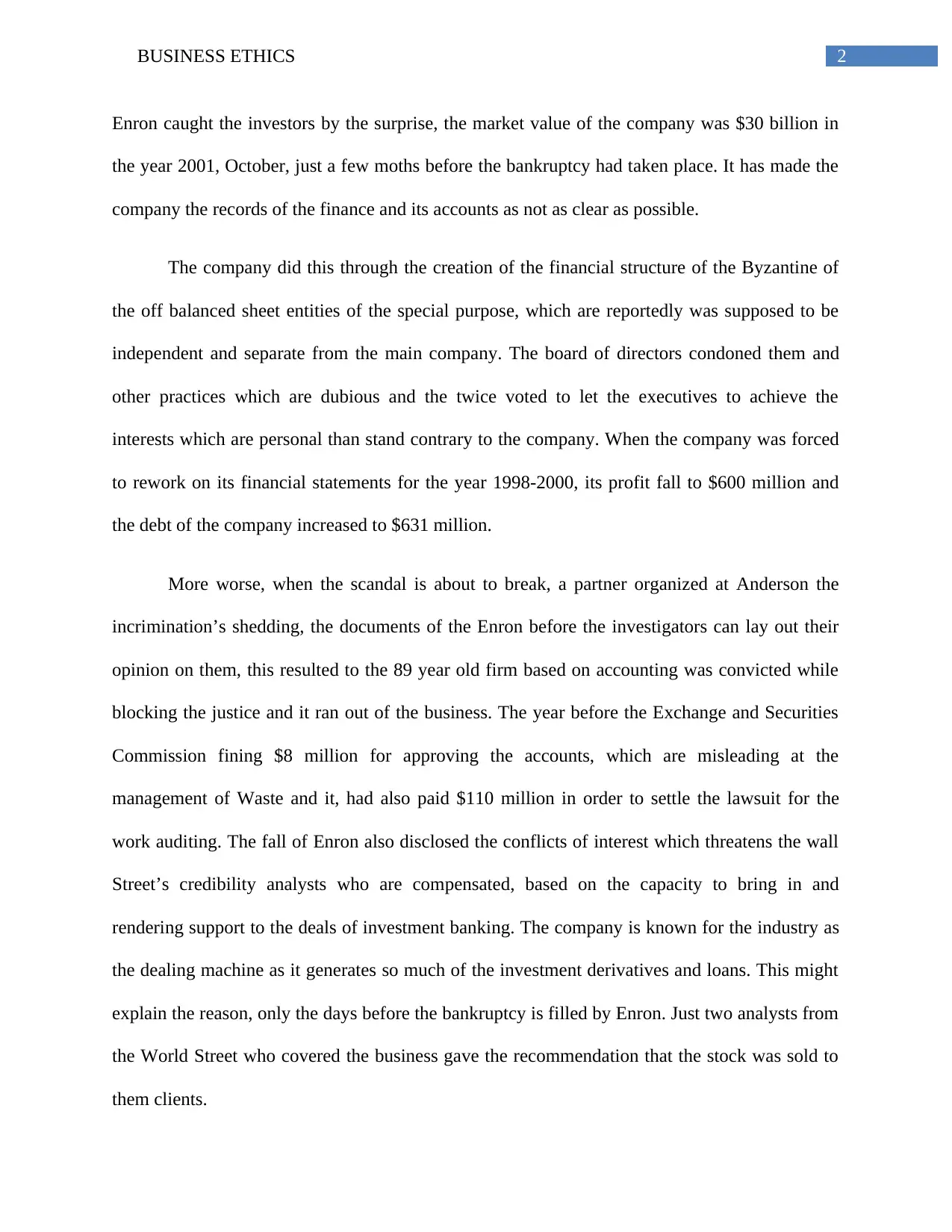
2BUSINESS ETHICS
Enron caught the investors by the surprise, the market value of the company was $30 billion in
the year 2001, October, just a few moths before the bankruptcy had taken place. It has made the
company the records of the finance and its accounts as not as clear as possible.
The company did this through the creation of the financial structure of the Byzantine of
the off balanced sheet entities of the special purpose, which are reportedly was supposed to be
independent and separate from the main company. The board of directors condoned them and
other practices which are dubious and the twice voted to let the executives to achieve the
interests which are personal than stand contrary to the company. When the company was forced
to rework on its financial statements for the year 1998-2000, its profit fall to $600 million and
the debt of the company increased to $631 million.
More worse, when the scandal is about to break, a partner organized at Anderson the
incrimination’s shedding, the documents of the Enron before the investigators can lay out their
opinion on them, this resulted to the 89 year old firm based on accounting was convicted while
blocking the justice and it ran out of the business. The year before the Exchange and Securities
Commission fining $8 million for approving the accounts, which are misleading at the
management of Waste and it, had also paid $110 million in order to settle the lawsuit for the
work auditing. The fall of Enron also disclosed the conflicts of interest which threatens the wall
Street’s credibility analysts who are compensated, based on the capacity to bring in and
rendering support to the deals of investment banking. The company is known for the industry as
the dealing machine as it generates so much of the investment derivatives and loans. This might
explain the reason, only the days before the bankruptcy is filled by Enron. Just two analysts from
the World Street who covered the business gave the recommendation that the stock was sold to
them clients.
Enron caught the investors by the surprise, the market value of the company was $30 billion in
the year 2001, October, just a few moths before the bankruptcy had taken place. It has made the
company the records of the finance and its accounts as not as clear as possible.
The company did this through the creation of the financial structure of the Byzantine of
the off balanced sheet entities of the special purpose, which are reportedly was supposed to be
independent and separate from the main company. The board of directors condoned them and
other practices which are dubious and the twice voted to let the executives to achieve the
interests which are personal than stand contrary to the company. When the company was forced
to rework on its financial statements for the year 1998-2000, its profit fall to $600 million and
the debt of the company increased to $631 million.
More worse, when the scandal is about to break, a partner organized at Anderson the
incrimination’s shedding, the documents of the Enron before the investigators can lay out their
opinion on them, this resulted to the 89 year old firm based on accounting was convicted while
blocking the justice and it ran out of the business. The year before the Exchange and Securities
Commission fining $8 million for approving the accounts, which are misleading at the
management of Waste and it, had also paid $110 million in order to settle the lawsuit for the
work auditing. The fall of Enron also disclosed the conflicts of interest which threatens the wall
Street’s credibility analysts who are compensated, based on the capacity to bring in and
rendering support to the deals of investment banking. The company is known for the industry as
the dealing machine as it generates so much of the investment derivatives and loans. This might
explain the reason, only the days before the bankruptcy is filled by Enron. Just two analysts from
the World Street who covered the business gave the recommendation that the stock was sold to
them clients.
⊘ This is a preview!⊘
Do you want full access?
Subscribe today to unlock all pages.

Trusted by 1+ million students worldwide
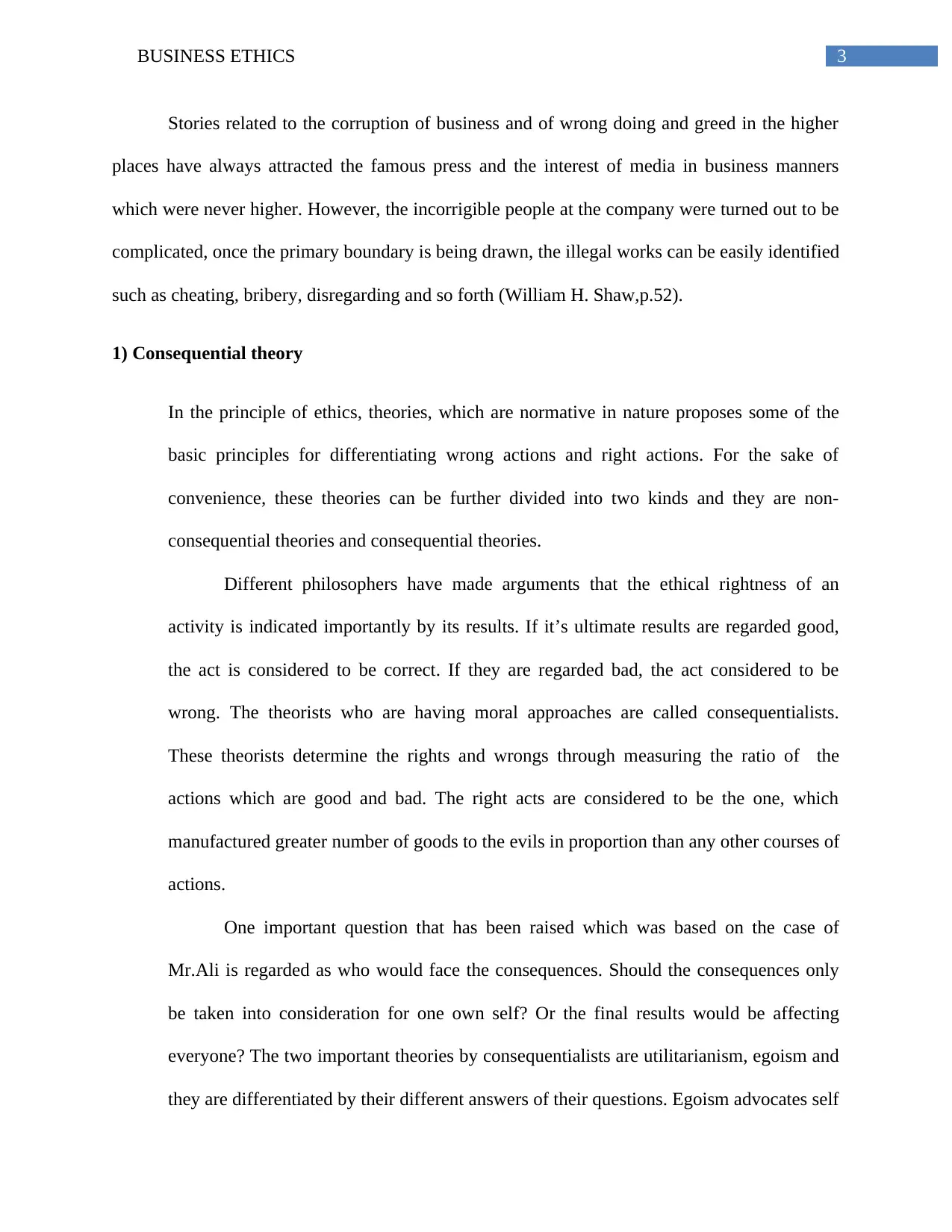
3BUSINESS ETHICS
Stories related to the corruption of business and of wrong doing and greed in the higher
places have always attracted the famous press and the interest of media in business manners
which were never higher. However, the incorrigible people at the company were turned out to be
complicated, once the primary boundary is being drawn, the illegal works can be easily identified
such as cheating, bribery, disregarding and so forth (William H. Shaw,p.52).
1) Consequential theory
In the principle of ethics, theories, which are normative in nature proposes some of the
basic principles for differentiating wrong actions and right actions. For the sake of
convenience, these theories can be further divided into two kinds and they are non-
consequential theories and consequential theories.
Different philosophers have made arguments that the ethical rightness of an
activity is indicated importantly by its results. If it’s ultimate results are regarded good,
the act is considered to be correct. If they are regarded bad, the act considered to be
wrong. The theorists who are having moral approaches are called consequentialists.
These theorists determine the rights and wrongs through measuring the ratio of the
actions which are good and bad. The right acts are considered to be the one, which
manufactured greater number of goods to the evils in proportion than any other courses of
actions.
One important question that has been raised which was based on the case of
Mr.Ali is regarded as who would face the consequences. Should the consequences only
be taken into consideration for one own self? Or the final results would be affecting
everyone? The two important theories by consequentialists are utilitarianism, egoism and
they are differentiated by their different answers of their questions. Egoism advocates self
Stories related to the corruption of business and of wrong doing and greed in the higher
places have always attracted the famous press and the interest of media in business manners
which were never higher. However, the incorrigible people at the company were turned out to be
complicated, once the primary boundary is being drawn, the illegal works can be easily identified
such as cheating, bribery, disregarding and so forth (William H. Shaw,p.52).
1) Consequential theory
In the principle of ethics, theories, which are normative in nature proposes some of the
basic principles for differentiating wrong actions and right actions. For the sake of
convenience, these theories can be further divided into two kinds and they are non-
consequential theories and consequential theories.
Different philosophers have made arguments that the ethical rightness of an
activity is indicated importantly by its results. If it’s ultimate results are regarded good,
the act is considered to be correct. If they are regarded bad, the act considered to be
wrong. The theorists who are having moral approaches are called consequentialists.
These theorists determine the rights and wrongs through measuring the ratio of the
actions which are good and bad. The right acts are considered to be the one, which
manufactured greater number of goods to the evils in proportion than any other courses of
actions.
One important question that has been raised which was based on the case of
Mr.Ali is regarded as who would face the consequences. Should the consequences only
be taken into consideration for one own self? Or the final results would be affecting
everyone? The two important theories by consequentialists are utilitarianism, egoism and
they are differentiated by their different answers of their questions. Egoism advocates self
Paraphrase This Document
Need a fresh take? Get an instant paraphrase of this document with our AI Paraphraser
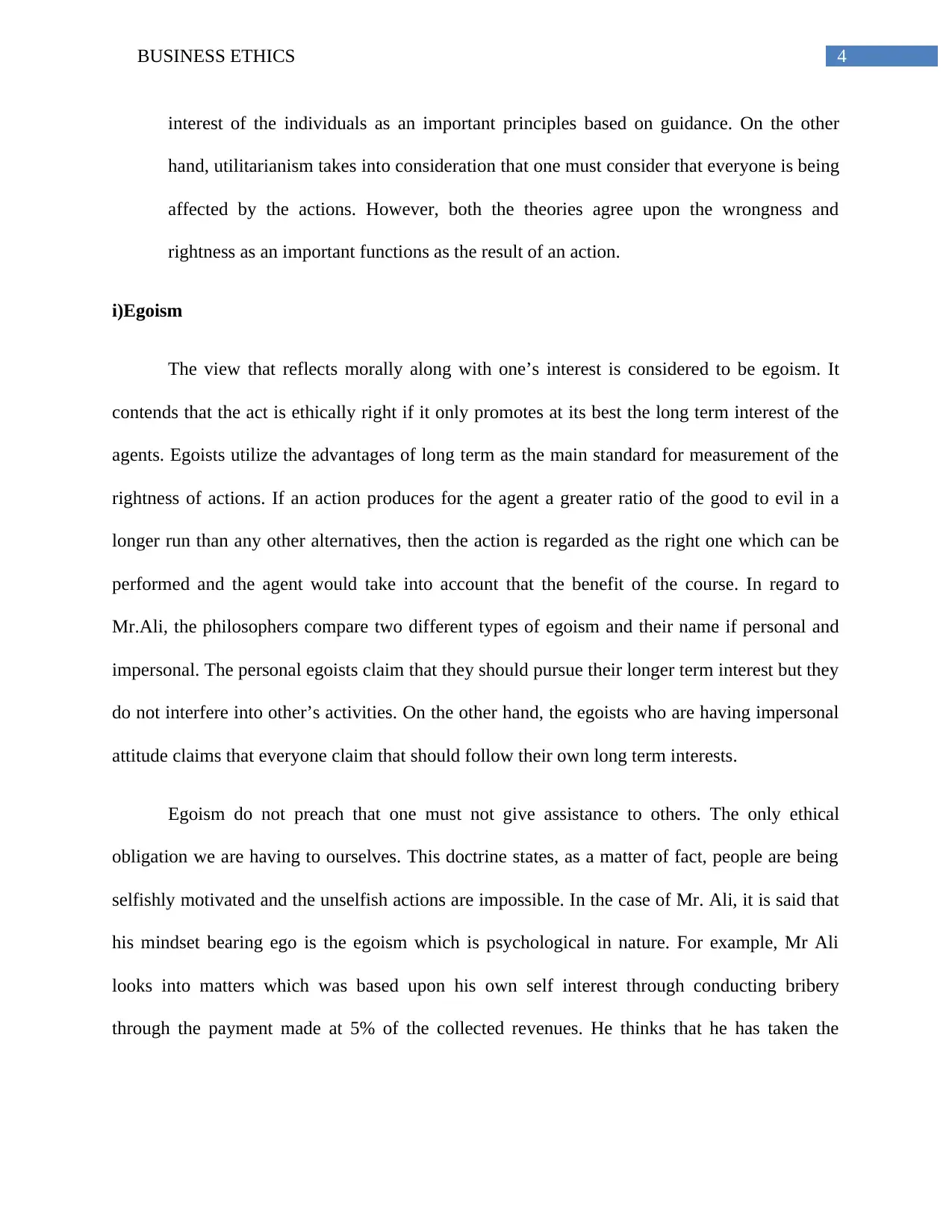
4BUSINESS ETHICS
interest of the individuals as an important principles based on guidance. On the other
hand, utilitarianism takes into consideration that one must consider that everyone is being
affected by the actions. However, both the theories agree upon the wrongness and
rightness as an important functions as the result of an action.
i)Egoism
The view that reflects morally along with one’s interest is considered to be egoism. It
contends that the act is ethically right if it only promotes at its best the long term interest of the
agents. Egoists utilize the advantages of long term as the main standard for measurement of the
rightness of actions. If an action produces for the agent a greater ratio of the good to evil in a
longer run than any other alternatives, then the action is regarded as the right one which can be
performed and the agent would take into account that the benefit of the course. In regard to
Mr.Ali, the philosophers compare two different types of egoism and their name if personal and
impersonal. The personal egoists claim that they should pursue their longer term interest but they
do not interfere into other’s activities. On the other hand, the egoists who are having impersonal
attitude claims that everyone claim that should follow their own long term interests.
Egoism do not preach that one must not give assistance to others. The only ethical
obligation we are having to ourselves. This doctrine states, as a matter of fact, people are being
selfishly motivated and the unselfish actions are impossible. In the case of Mr. Ali, it is said that
his mindset bearing ego is the egoism which is psychological in nature. For example, Mr Ali
looks into matters which was based upon his own self interest through conducting bribery
through the payment made at 5% of the collected revenues. He thinks that he has taken the
interest of the individuals as an important principles based on guidance. On the other
hand, utilitarianism takes into consideration that one must consider that everyone is being
affected by the actions. However, both the theories agree upon the wrongness and
rightness as an important functions as the result of an action.
i)Egoism
The view that reflects morally along with one’s interest is considered to be egoism. It
contends that the act is ethically right if it only promotes at its best the long term interest of the
agents. Egoists utilize the advantages of long term as the main standard for measurement of the
rightness of actions. If an action produces for the agent a greater ratio of the good to evil in a
longer run than any other alternatives, then the action is regarded as the right one which can be
performed and the agent would take into account that the benefit of the course. In regard to
Mr.Ali, the philosophers compare two different types of egoism and their name if personal and
impersonal. The personal egoists claim that they should pursue their longer term interest but they
do not interfere into other’s activities. On the other hand, the egoists who are having impersonal
attitude claims that everyone claim that should follow their own long term interests.
Egoism do not preach that one must not give assistance to others. The only ethical
obligation we are having to ourselves. This doctrine states, as a matter of fact, people are being
selfishly motivated and the unselfish actions are impossible. In the case of Mr. Ali, it is said that
his mindset bearing ego is the egoism which is psychological in nature. For example, Mr Ali
looks into matters which was based upon his own self interest through conducting bribery
through the payment made at 5% of the collected revenues. He thinks that he has taken the
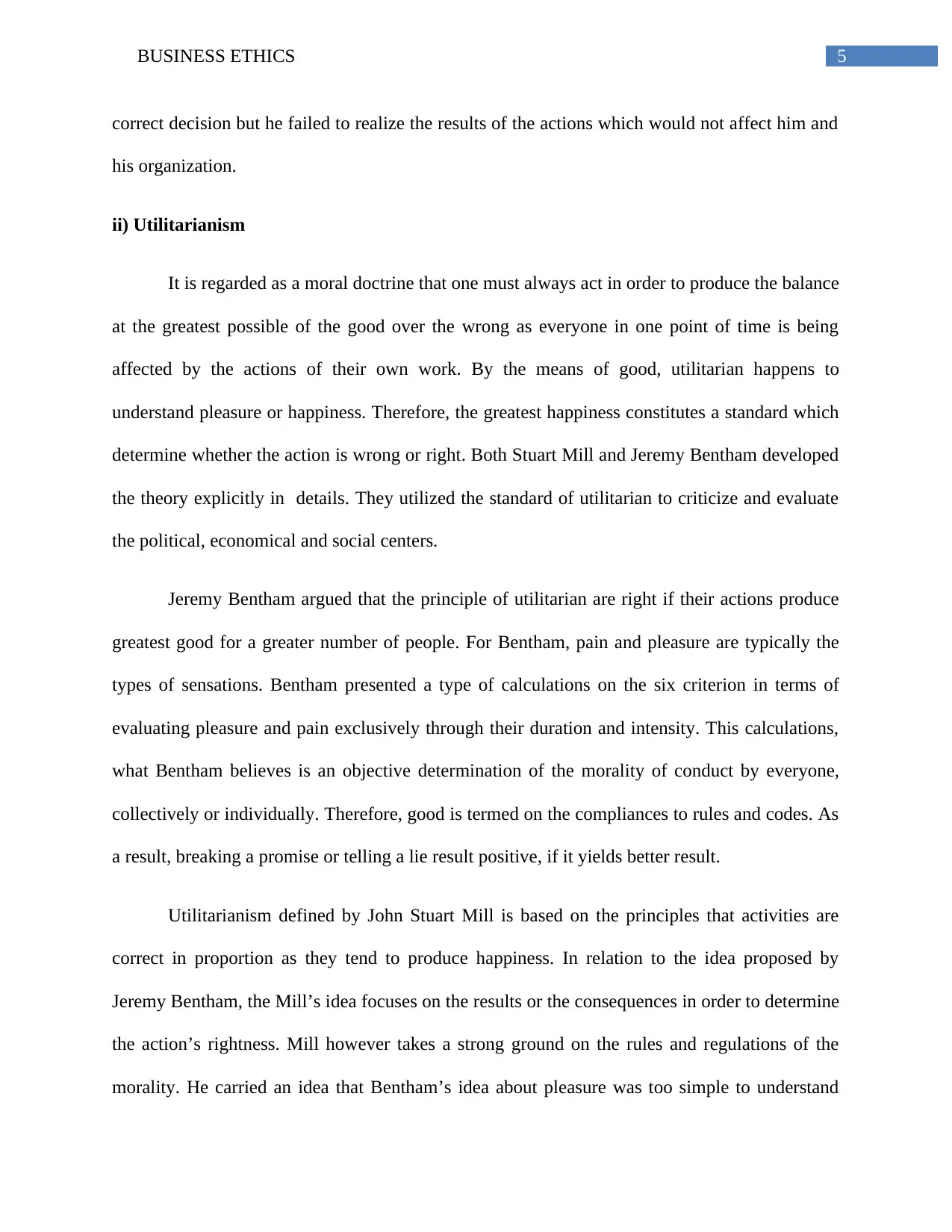
5BUSINESS ETHICS
correct decision but he failed to realize the results of the actions which would not affect him and
his organization.
ii) Utilitarianism
It is regarded as a moral doctrine that one must always act in order to produce the balance
at the greatest possible of the good over the wrong as everyone in one point of time is being
affected by the actions of their own work. By the means of good, utilitarian happens to
understand pleasure or happiness. Therefore, the greatest happiness constitutes a standard which
determine whether the action is wrong or right. Both Stuart Mill and Jeremy Bentham developed
the theory explicitly in details. They utilized the standard of utilitarian to criticize and evaluate
the political, economical and social centers.
Jeremy Bentham argued that the principle of utilitarian are right if their actions produce
greatest good for a greater number of people. For Bentham, pain and pleasure are typically the
types of sensations. Bentham presented a type of calculations on the six criterion in terms of
evaluating pleasure and pain exclusively through their duration and intensity. This calculations,
what Bentham believes is an objective determination of the morality of conduct by everyone,
collectively or individually. Therefore, good is termed on the compliances to rules and codes. As
a result, breaking a promise or telling a lie result positive, if it yields better result.
Utilitarianism defined by John Stuart Mill is based on the principles that activities are
correct in proportion as they tend to produce happiness. In relation to the idea proposed by
Jeremy Bentham, the Mill’s idea focuses on the results or the consequences in order to determine
the action’s rightness. Mill however takes a strong ground on the rules and regulations of the
morality. He carried an idea that Bentham’s idea about pleasure was too simple to understand
correct decision but he failed to realize the results of the actions which would not affect him and
his organization.
ii) Utilitarianism
It is regarded as a moral doctrine that one must always act in order to produce the balance
at the greatest possible of the good over the wrong as everyone in one point of time is being
affected by the actions of their own work. By the means of good, utilitarian happens to
understand pleasure or happiness. Therefore, the greatest happiness constitutes a standard which
determine whether the action is wrong or right. Both Stuart Mill and Jeremy Bentham developed
the theory explicitly in details. They utilized the standard of utilitarian to criticize and evaluate
the political, economical and social centers.
Jeremy Bentham argued that the principle of utilitarian are right if their actions produce
greatest good for a greater number of people. For Bentham, pain and pleasure are typically the
types of sensations. Bentham presented a type of calculations on the six criterion in terms of
evaluating pleasure and pain exclusively through their duration and intensity. This calculations,
what Bentham believes is an objective determination of the morality of conduct by everyone,
collectively or individually. Therefore, good is termed on the compliances to rules and codes. As
a result, breaking a promise or telling a lie result positive, if it yields better result.
Utilitarianism defined by John Stuart Mill is based on the principles that activities are
correct in proportion as they tend to produce happiness. In relation to the idea proposed by
Jeremy Bentham, the Mill’s idea focuses on the results or the consequences in order to determine
the action’s rightness. Mill however takes a strong ground on the rules and regulations of the
morality. He carried an idea that Bentham’s idea about pleasure was too simple to understand
⊘ This is a preview!⊘
Do you want full access?
Subscribe today to unlock all pages.

Trusted by 1+ million students worldwide
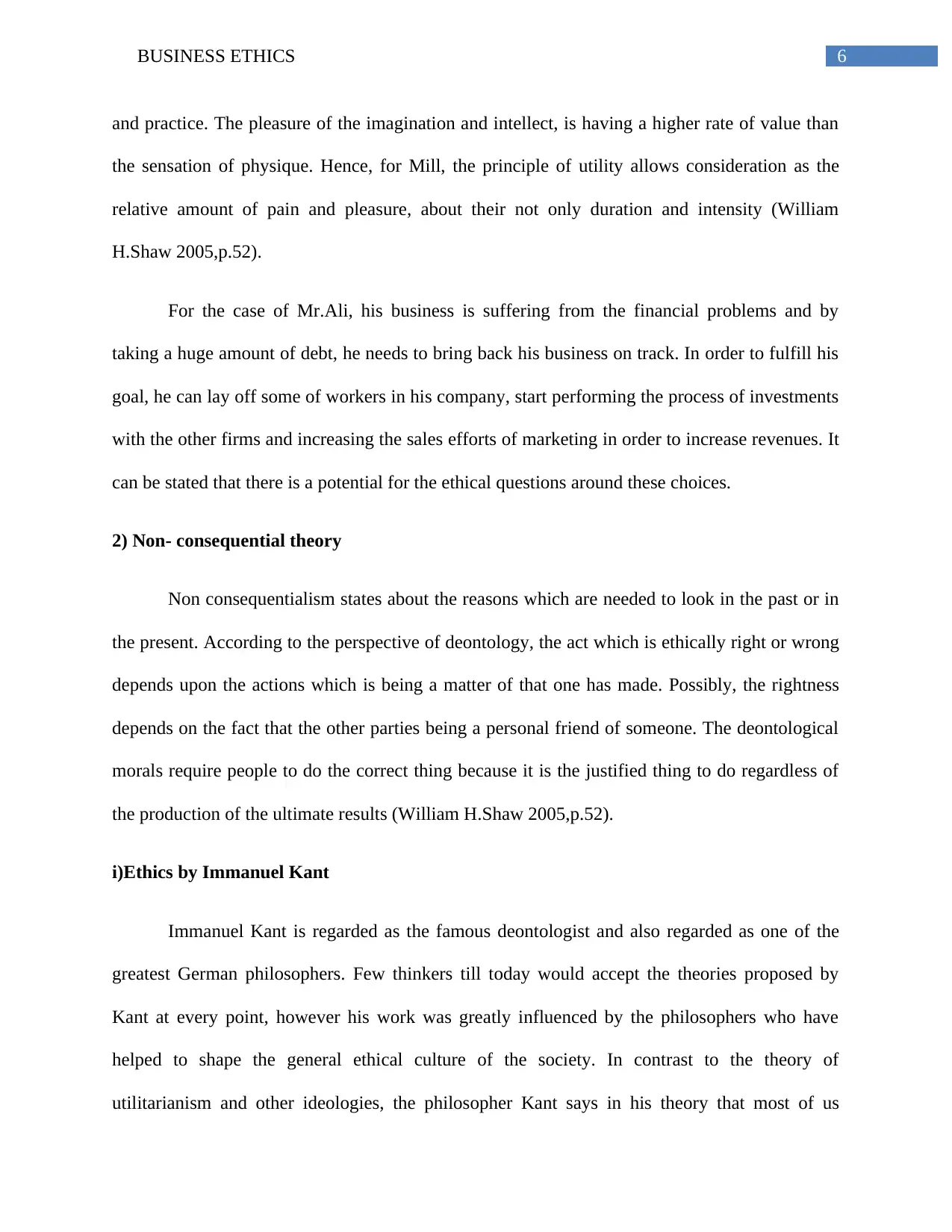
6BUSINESS ETHICS
and practice. The pleasure of the imagination and intellect, is having a higher rate of value than
the sensation of physique. Hence, for Mill, the principle of utility allows consideration as the
relative amount of pain and pleasure, about their not only duration and intensity (William
H.Shaw 2005,p.52).
For the case of Mr.Ali, his business is suffering from the financial problems and by
taking a huge amount of debt, he needs to bring back his business on track. In order to fulfill his
goal, he can lay off some of workers in his company, start performing the process of investments
with the other firms and increasing the sales efforts of marketing in order to increase revenues. It
can be stated that there is a potential for the ethical questions around these choices.
2) Non- consequential theory
Non consequentialism states about the reasons which are needed to look in the past or in
the present. According to the perspective of deontology, the act which is ethically right or wrong
depends upon the actions which is being a matter of that one has made. Possibly, the rightness
depends on the fact that the other parties being a personal friend of someone. The deontological
morals require people to do the correct thing because it is the justified thing to do regardless of
the production of the ultimate results (William H.Shaw 2005,p.52).
i)Ethics by Immanuel Kant
Immanuel Kant is regarded as the famous deontologist and also regarded as one of the
greatest German philosophers. Few thinkers till today would accept the theories proposed by
Kant at every point, however his work was greatly influenced by the philosophers who have
helped to shape the general ethical culture of the society. In contrast to the theory of
utilitarianism and other ideologies, the philosopher Kant says in his theory that most of us
and practice. The pleasure of the imagination and intellect, is having a higher rate of value than
the sensation of physique. Hence, for Mill, the principle of utility allows consideration as the
relative amount of pain and pleasure, about their not only duration and intensity (William
H.Shaw 2005,p.52).
For the case of Mr.Ali, his business is suffering from the financial problems and by
taking a huge amount of debt, he needs to bring back his business on track. In order to fulfill his
goal, he can lay off some of workers in his company, start performing the process of investments
with the other firms and increasing the sales efforts of marketing in order to increase revenues. It
can be stated that there is a potential for the ethical questions around these choices.
2) Non- consequential theory
Non consequentialism states about the reasons which are needed to look in the past or in
the present. According to the perspective of deontology, the act which is ethically right or wrong
depends upon the actions which is being a matter of that one has made. Possibly, the rightness
depends on the fact that the other parties being a personal friend of someone. The deontological
morals require people to do the correct thing because it is the justified thing to do regardless of
the production of the ultimate results (William H.Shaw 2005,p.52).
i)Ethics by Immanuel Kant
Immanuel Kant is regarded as the famous deontologist and also regarded as one of the
greatest German philosophers. Few thinkers till today would accept the theories proposed by
Kant at every point, however his work was greatly influenced by the philosophers who have
helped to shape the general ethical culture of the society. In contrast to the theory of
utilitarianism and other ideologies, the philosopher Kant says in his theory that most of us
Paraphrase This Document
Need a fresh take? Get an instant paraphrase of this document with our AI Paraphraser
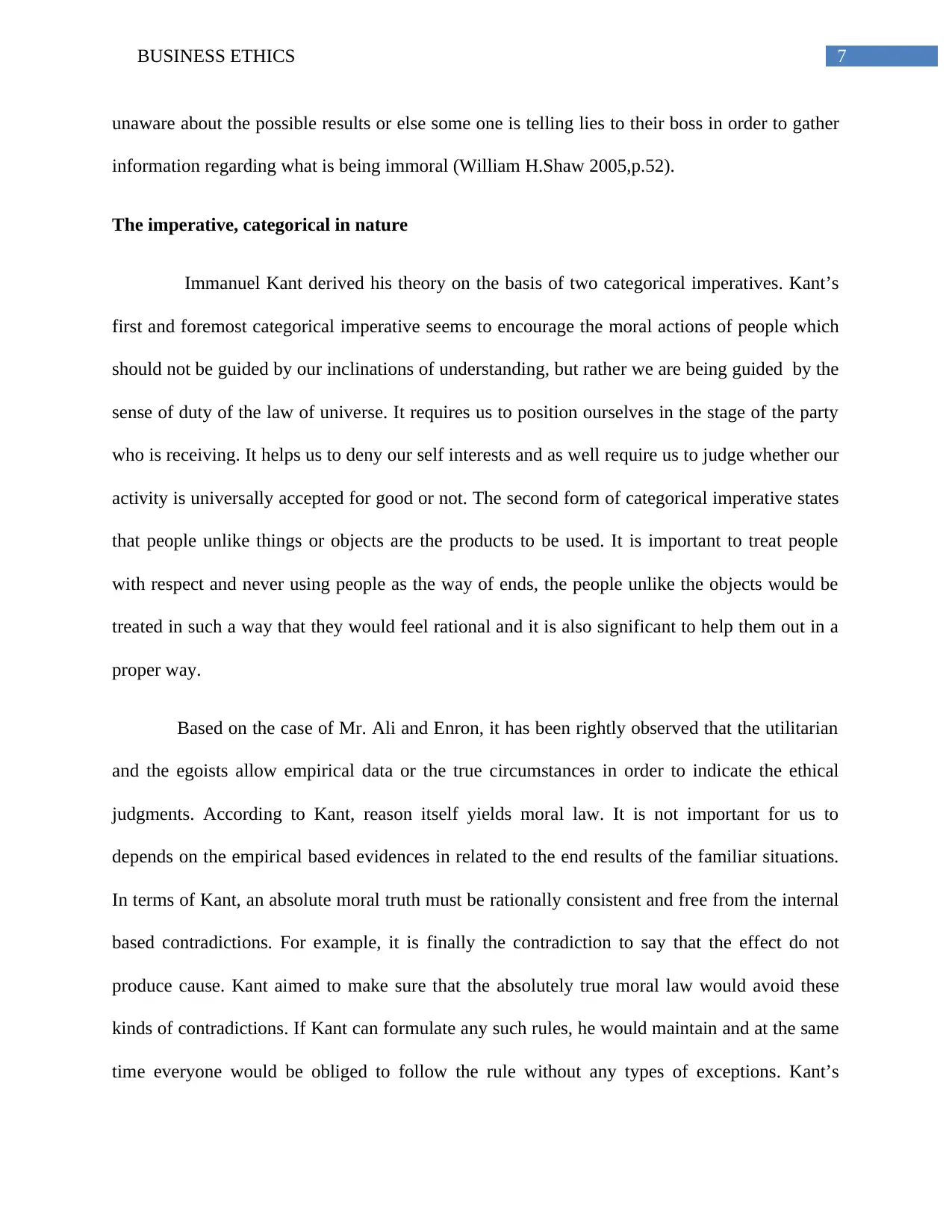
7BUSINESS ETHICS
unaware about the possible results or else some one is telling lies to their boss in order to gather
information regarding what is being immoral (William H.Shaw 2005,p.52).
The imperative, categorical in nature
Immanuel Kant derived his theory on the basis of two categorical imperatives. Kant’s
first and foremost categorical imperative seems to encourage the moral actions of people which
should not be guided by our inclinations of understanding, but rather we are being guided by the
sense of duty of the law of universe. It requires us to position ourselves in the stage of the party
who is receiving. It helps us to deny our self interests and as well require us to judge whether our
activity is universally accepted for good or not. The second form of categorical imperative states
that people unlike things or objects are the products to be used. It is important to treat people
with respect and never using people as the way of ends, the people unlike the objects would be
treated in such a way that they would feel rational and it is also significant to help them out in a
proper way.
Based on the case of Mr. Ali and Enron, it has been rightly observed that the utilitarian
and the egoists allow empirical data or the true circumstances in order to indicate the ethical
judgments. According to Kant, reason itself yields moral law. It is not important for us to
depends on the empirical based evidences in related to the end results of the familiar situations.
In terms of Kant, an absolute moral truth must be rationally consistent and free from the internal
based contradictions. For example, it is finally the contradiction to say that the effect do not
produce cause. Kant aimed to make sure that the absolutely true moral law would avoid these
kinds of contradictions. If Kant can formulate any such rules, he would maintain and at the same
time everyone would be obliged to follow the rule without any types of exceptions. Kant’s
unaware about the possible results or else some one is telling lies to their boss in order to gather
information regarding what is being immoral (William H.Shaw 2005,p.52).
The imperative, categorical in nature
Immanuel Kant derived his theory on the basis of two categorical imperatives. Kant’s
first and foremost categorical imperative seems to encourage the moral actions of people which
should not be guided by our inclinations of understanding, but rather we are being guided by the
sense of duty of the law of universe. It requires us to position ourselves in the stage of the party
who is receiving. It helps us to deny our self interests and as well require us to judge whether our
activity is universally accepted for good or not. The second form of categorical imperative states
that people unlike things or objects are the products to be used. It is important to treat people
with respect and never using people as the way of ends, the people unlike the objects would be
treated in such a way that they would feel rational and it is also significant to help them out in a
proper way.
Based on the case of Mr. Ali and Enron, it has been rightly observed that the utilitarian
and the egoists allow empirical data or the true circumstances in order to indicate the ethical
judgments. According to Kant, reason itself yields moral law. It is not important for us to
depends on the empirical based evidences in related to the end results of the familiar situations.
In terms of Kant, an absolute moral truth must be rationally consistent and free from the internal
based contradictions. For example, it is finally the contradiction to say that the effect do not
produce cause. Kant aimed to make sure that the absolutely true moral law would avoid these
kinds of contradictions. If Kant can formulate any such rules, he would maintain and at the same
time everyone would be obliged to follow the rule without any types of exceptions. Kant’s
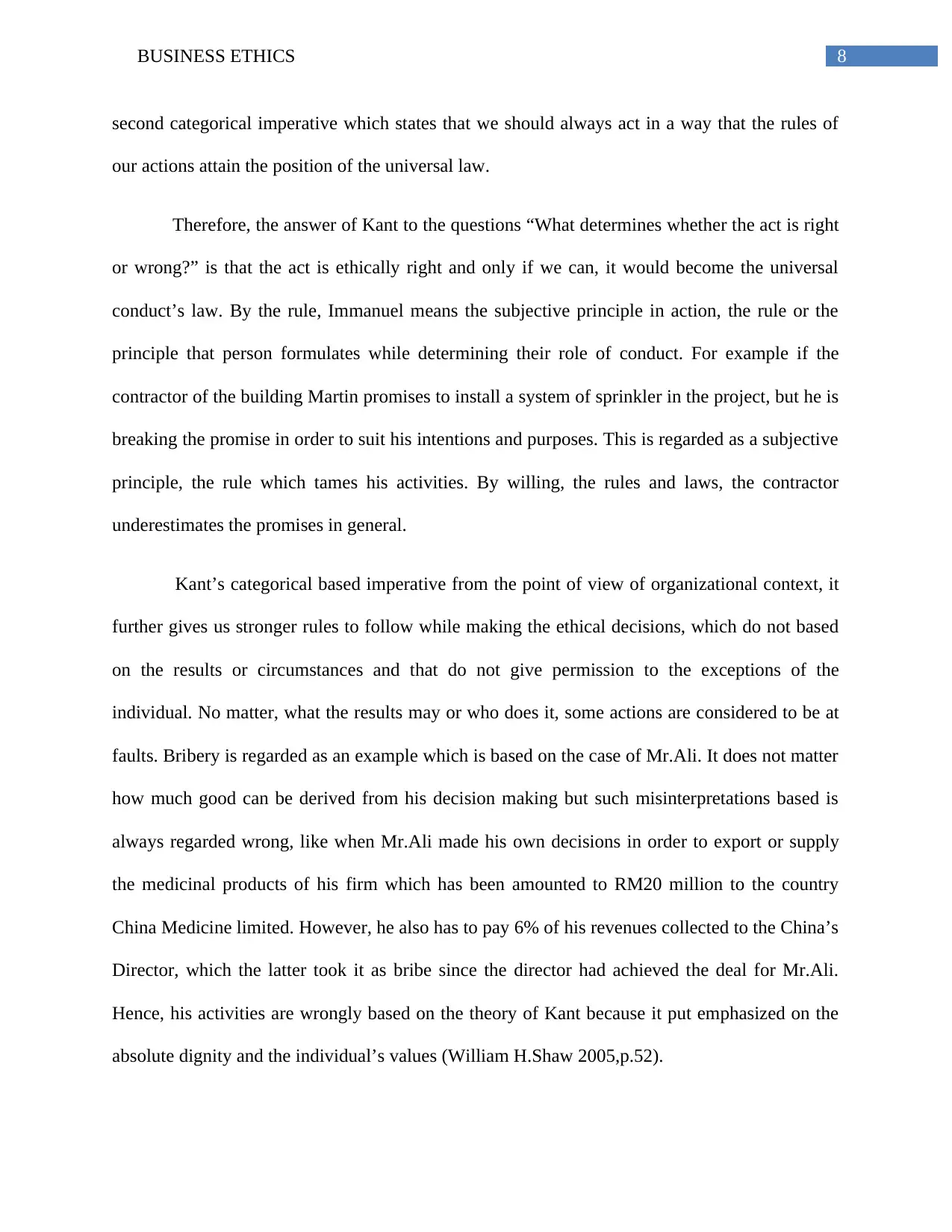
8BUSINESS ETHICS
second categorical imperative which states that we should always act in a way that the rules of
our actions attain the position of the universal law.
Therefore, the answer of Kant to the questions “What determines whether the act is right
or wrong?” is that the act is ethically right and only if we can, it would become the universal
conduct’s law. By the rule, Immanuel means the subjective principle in action, the rule or the
principle that person formulates while determining their role of conduct. For example if the
contractor of the building Martin promises to install a system of sprinkler in the project, but he is
breaking the promise in order to suit his intentions and purposes. This is regarded as a subjective
principle, the rule which tames his activities. By willing, the rules and laws, the contractor
underestimates the promises in general.
Kant’s categorical based imperative from the point of view of organizational context, it
further gives us stronger rules to follow while making the ethical decisions, which do not based
on the results or circumstances and that do not give permission to the exceptions of the
individual. No matter, what the results may or who does it, some actions are considered to be at
faults. Bribery is regarded as an example which is based on the case of Mr.Ali. It does not matter
how much good can be derived from his decision making but such misinterpretations based is
always regarded wrong, like when Mr.Ali made his own decisions in order to export or supply
the medicinal products of his firm which has been amounted to RM20 million to the country
China Medicine limited. However, he also has to pay 6% of his revenues collected to the China’s
Director, which the latter took it as bribe since the director had achieved the deal for Mr.Ali.
Hence, his activities are wrongly based on the theory of Kant because it put emphasized on the
absolute dignity and the individual’s values (William H.Shaw 2005,p.52).
second categorical imperative which states that we should always act in a way that the rules of
our actions attain the position of the universal law.
Therefore, the answer of Kant to the questions “What determines whether the act is right
or wrong?” is that the act is ethically right and only if we can, it would become the universal
conduct’s law. By the rule, Immanuel means the subjective principle in action, the rule or the
principle that person formulates while determining their role of conduct. For example if the
contractor of the building Martin promises to install a system of sprinkler in the project, but he is
breaking the promise in order to suit his intentions and purposes. This is regarded as a subjective
principle, the rule which tames his activities. By willing, the rules and laws, the contractor
underestimates the promises in general.
Kant’s categorical based imperative from the point of view of organizational context, it
further gives us stronger rules to follow while making the ethical decisions, which do not based
on the results or circumstances and that do not give permission to the exceptions of the
individual. No matter, what the results may or who does it, some actions are considered to be at
faults. Bribery is regarded as an example which is based on the case of Mr.Ali. It does not matter
how much good can be derived from his decision making but such misinterpretations based is
always regarded wrong, like when Mr.Ali made his own decisions in order to export or supply
the medicinal products of his firm which has been amounted to RM20 million to the country
China Medicine limited. However, he also has to pay 6% of his revenues collected to the China’s
Director, which the latter took it as bribe since the director had achieved the deal for Mr.Ali.
Hence, his activities are wrongly based on the theory of Kant because it put emphasized on the
absolute dignity and the individual’s values (William H.Shaw 2005,p.52).
⊘ This is a preview!⊘
Do you want full access?
Subscribe today to unlock all pages.

Trusted by 1+ million students worldwide
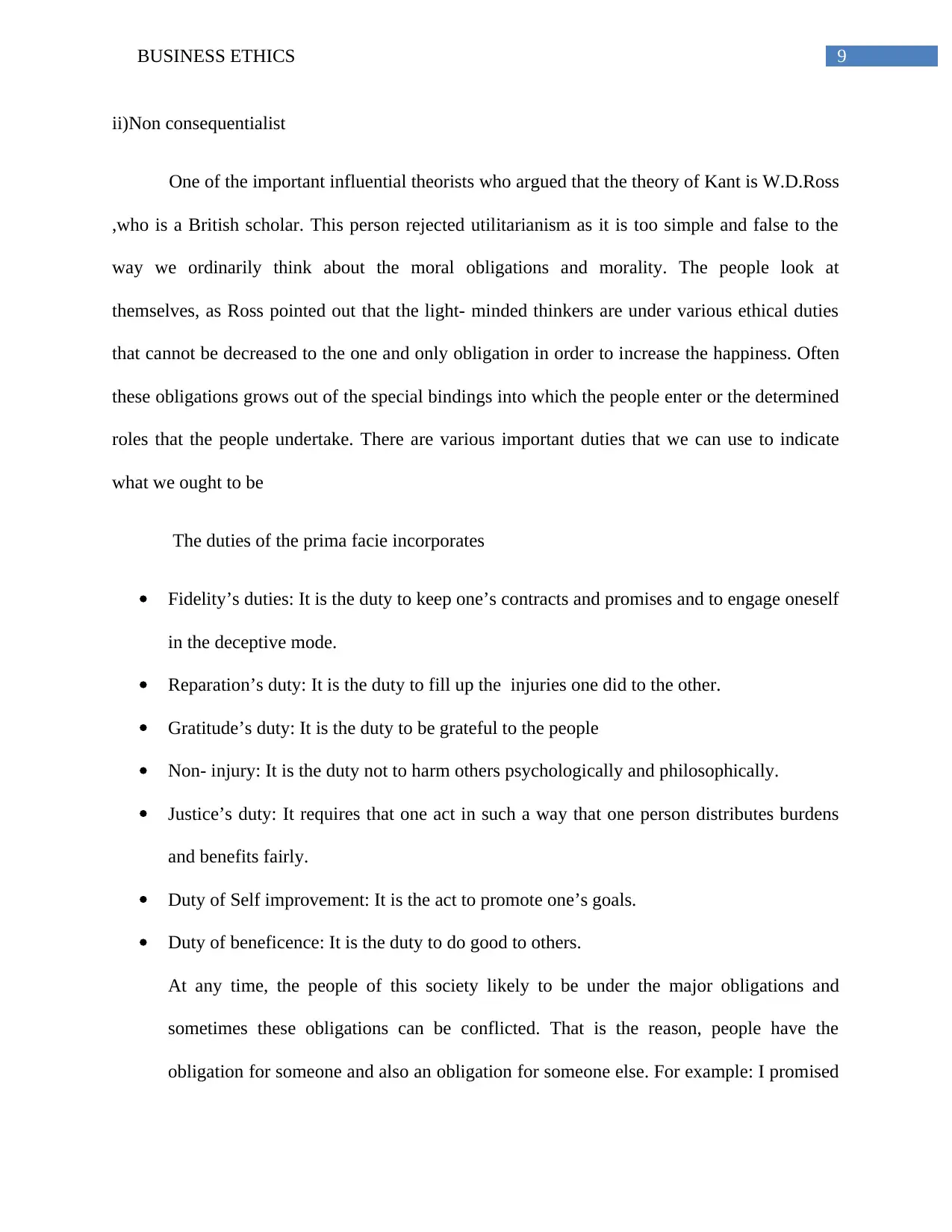
9BUSINESS ETHICS
ii)Non consequentialist
One of the important influential theorists who argued that the theory of Kant is W.D.Ross
,who is a British scholar. This person rejected utilitarianism as it is too simple and false to the
way we ordinarily think about the moral obligations and morality. The people look at
themselves, as Ross pointed out that the light- minded thinkers are under various ethical duties
that cannot be decreased to the one and only obligation in order to increase the happiness. Often
these obligations grows out of the special bindings into which the people enter or the determined
roles that the people undertake. There are various important duties that we can use to indicate
what we ought to be
The duties of the prima facie incorporates
Fidelity’s duties: It is the duty to keep one’s contracts and promises and to engage oneself
in the deceptive mode.
Reparation’s duty: It is the duty to fill up the injuries one did to the other.
Gratitude’s duty: It is the duty to be grateful to the people
Non- injury: It is the duty not to harm others psychologically and philosophically.
Justice’s duty: It requires that one act in such a way that one person distributes burdens
and benefits fairly.
Duty of Self improvement: It is the act to promote one’s goals.
Duty of beneficence: It is the duty to do good to others.
At any time, the people of this society likely to be under the major obligations and
sometimes these obligations can be conflicted. That is the reason, people have the
obligation for someone and also an obligation for someone else. For example: I promised
ii)Non consequentialist
One of the important influential theorists who argued that the theory of Kant is W.D.Ross
,who is a British scholar. This person rejected utilitarianism as it is too simple and false to the
way we ordinarily think about the moral obligations and morality. The people look at
themselves, as Ross pointed out that the light- minded thinkers are under various ethical duties
that cannot be decreased to the one and only obligation in order to increase the happiness. Often
these obligations grows out of the special bindings into which the people enter or the determined
roles that the people undertake. There are various important duties that we can use to indicate
what we ought to be
The duties of the prima facie incorporates
Fidelity’s duties: It is the duty to keep one’s contracts and promises and to engage oneself
in the deceptive mode.
Reparation’s duty: It is the duty to fill up the injuries one did to the other.
Gratitude’s duty: It is the duty to be grateful to the people
Non- injury: It is the duty not to harm others psychologically and philosophically.
Justice’s duty: It requires that one act in such a way that one person distributes burdens
and benefits fairly.
Duty of Self improvement: It is the act to promote one’s goals.
Duty of beneficence: It is the duty to do good to others.
At any time, the people of this society likely to be under the major obligations and
sometimes these obligations can be conflicted. That is the reason, people have the
obligation for someone and also an obligation for someone else. For example: I promised
Paraphrase This Document
Need a fresh take? Get an instant paraphrase of this document with our AI Paraphraser
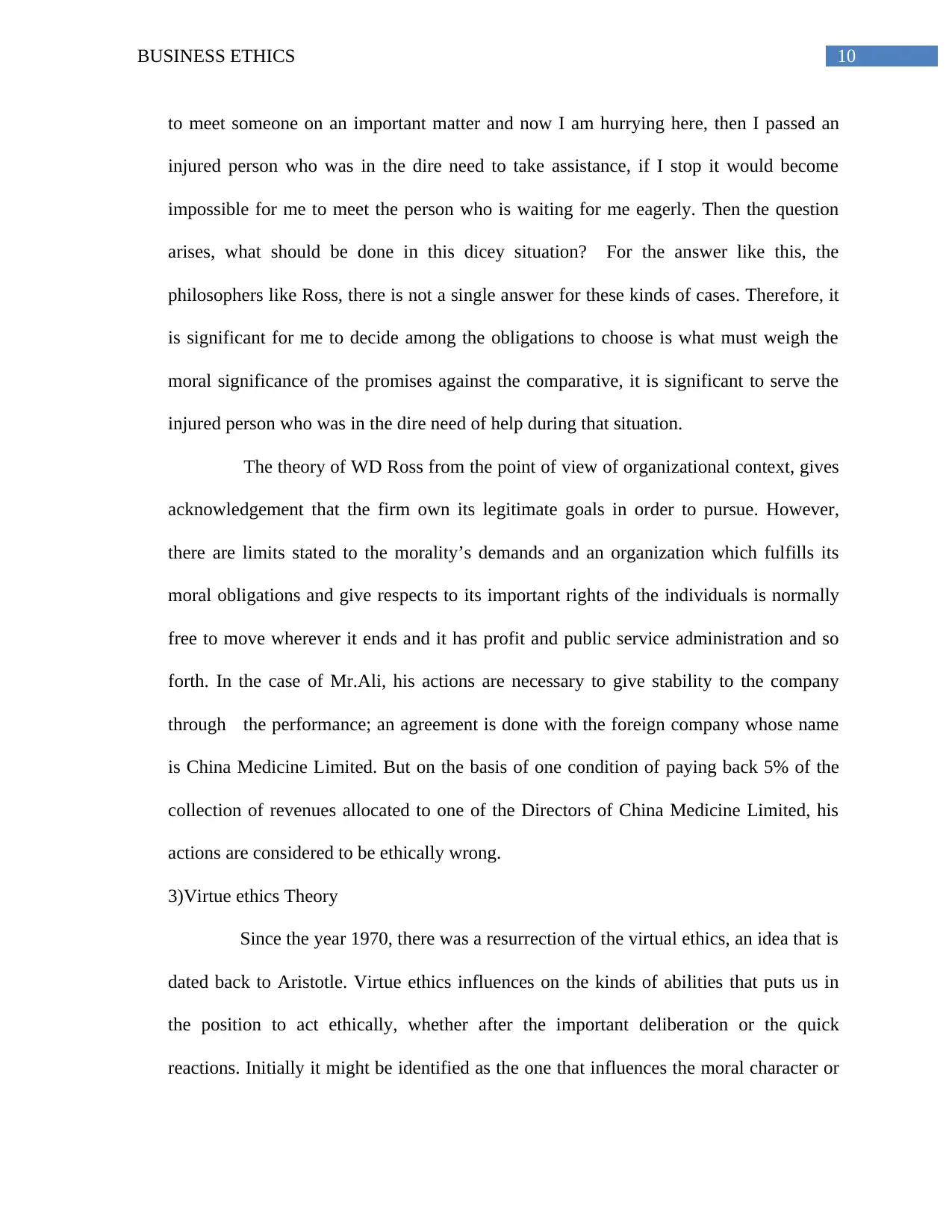
10BUSINESS ETHICS
to meet someone on an important matter and now I am hurrying here, then I passed an
injured person who was in the dire need to take assistance, if I stop it would become
impossible for me to meet the person who is waiting for me eagerly. Then the question
arises, what should be done in this dicey situation? For the answer like this, the
philosophers like Ross, there is not a single answer for these kinds of cases. Therefore, it
is significant for me to decide among the obligations to choose is what must weigh the
moral significance of the promises against the comparative, it is significant to serve the
injured person who was in the dire need of help during that situation.
The theory of WD Ross from the point of view of organizational context, gives
acknowledgement that the firm own its legitimate goals in order to pursue. However,
there are limits stated to the morality’s demands and an organization which fulfills its
moral obligations and give respects to its important rights of the individuals is normally
free to move wherever it ends and it has profit and public service administration and so
forth. In the case of Mr.Ali, his actions are necessary to give stability to the company
through the performance; an agreement is done with the foreign company whose name
is China Medicine Limited. But on the basis of one condition of paying back 5% of the
collection of revenues allocated to one of the Directors of China Medicine Limited, his
actions are considered to be ethically wrong.
3)Virtue ethics Theory
Since the year 1970, there was a resurrection of the virtual ethics, an idea that is
dated back to Aristotle. Virtue ethics influences on the kinds of abilities that puts us in
the position to act ethically, whether after the important deliberation or the quick
reactions. Initially it might be identified as the one that influences the moral character or
to meet someone on an important matter and now I am hurrying here, then I passed an
injured person who was in the dire need to take assistance, if I stop it would become
impossible for me to meet the person who is waiting for me eagerly. Then the question
arises, what should be done in this dicey situation? For the answer like this, the
philosophers like Ross, there is not a single answer for these kinds of cases. Therefore, it
is significant for me to decide among the obligations to choose is what must weigh the
moral significance of the promises against the comparative, it is significant to serve the
injured person who was in the dire need of help during that situation.
The theory of WD Ross from the point of view of organizational context, gives
acknowledgement that the firm own its legitimate goals in order to pursue. However,
there are limits stated to the morality’s demands and an organization which fulfills its
moral obligations and give respects to its important rights of the individuals is normally
free to move wherever it ends and it has profit and public service administration and so
forth. In the case of Mr.Ali, his actions are necessary to give stability to the company
through the performance; an agreement is done with the foreign company whose name
is China Medicine Limited. But on the basis of one condition of paying back 5% of the
collection of revenues allocated to one of the Directors of China Medicine Limited, his
actions are considered to be ethically wrong.
3)Virtue ethics Theory
Since the year 1970, there was a resurrection of the virtual ethics, an idea that is
dated back to Aristotle. Virtue ethics influences on the kinds of abilities that puts us in
the position to act ethically, whether after the important deliberation or the quick
reactions. Initially it might be identified as the one that influences the moral character or
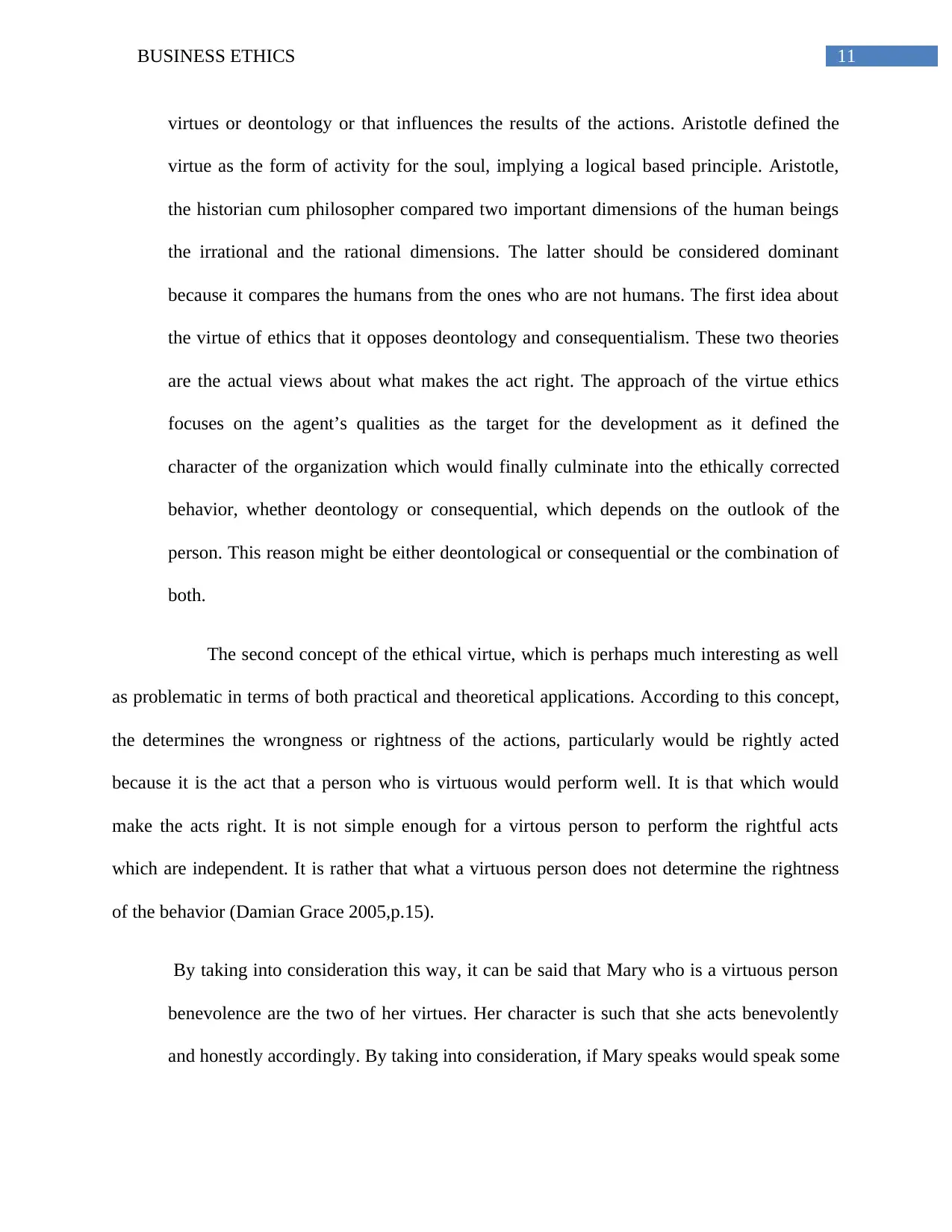
11BUSINESS ETHICS
virtues or deontology or that influences the results of the actions. Aristotle defined the
virtue as the form of activity for the soul, implying a logical based principle. Aristotle,
the historian cum philosopher compared two important dimensions of the human beings
the irrational and the rational dimensions. The latter should be considered dominant
because it compares the humans from the ones who are not humans. The first idea about
the virtue of ethics that it opposes deontology and consequentialism. These two theories
are the actual views about what makes the act right. The approach of the virtue ethics
focuses on the agent’s qualities as the target for the development as it defined the
character of the organization which would finally culminate into the ethically corrected
behavior, whether deontology or consequential, which depends on the outlook of the
person. This reason might be either deontological or consequential or the combination of
both.
The second concept of the ethical virtue, which is perhaps much interesting as well
as problematic in terms of both practical and theoretical applications. According to this concept,
the determines the wrongness or rightness of the actions, particularly would be rightly acted
because it is the act that a person who is virtuous would perform well. It is that which would
make the acts right. It is not simple enough for a virtous person to perform the rightful acts
which are independent. It is rather that what a virtuous person does not determine the rightness
of the behavior (Damian Grace 2005,p.15).
By taking into consideration this way, it can be said that Mary who is a virtuous person
benevolence are the two of her virtues. Her character is such that she acts benevolently
and honestly accordingly. By taking into consideration, if Mary speaks would speak some
virtues or deontology or that influences the results of the actions. Aristotle defined the
virtue as the form of activity for the soul, implying a logical based principle. Aristotle,
the historian cum philosopher compared two important dimensions of the human beings
the irrational and the rational dimensions. The latter should be considered dominant
because it compares the humans from the ones who are not humans. The first idea about
the virtue of ethics that it opposes deontology and consequentialism. These two theories
are the actual views about what makes the act right. The approach of the virtue ethics
focuses on the agent’s qualities as the target for the development as it defined the
character of the organization which would finally culminate into the ethically corrected
behavior, whether deontology or consequential, which depends on the outlook of the
person. This reason might be either deontological or consequential or the combination of
both.
The second concept of the ethical virtue, which is perhaps much interesting as well
as problematic in terms of both practical and theoretical applications. According to this concept,
the determines the wrongness or rightness of the actions, particularly would be rightly acted
because it is the act that a person who is virtuous would perform well. It is that which would
make the acts right. It is not simple enough for a virtous person to perform the rightful acts
which are independent. It is rather that what a virtuous person does not determine the rightness
of the behavior (Damian Grace 2005,p.15).
By taking into consideration this way, it can be said that Mary who is a virtuous person
benevolence are the two of her virtues. Her character is such that she acts benevolently
and honestly accordingly. By taking into consideration, if Mary speaks would speak some
⊘ This is a preview!⊘
Do you want full access?
Subscribe today to unlock all pages.

Trusted by 1+ million students worldwide
1 out of 20
Related Documents
Your All-in-One AI-Powered Toolkit for Academic Success.
+13062052269
info@desklib.com
Available 24*7 on WhatsApp / Email
![[object Object]](/_next/static/media/star-bottom.7253800d.svg)
Unlock your academic potential
Copyright © 2020–2026 A2Z Services. All Rights Reserved. Developed and managed by ZUCOL.





